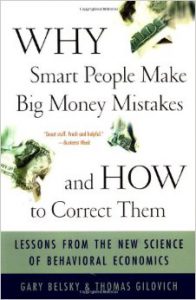A few of months back I was listening to this humorous NPR podcast called “Why Most Economists Might As Well Be Studying Unicorns” where Shankar Vedantam was having a conversation with the behavioural economist Richard Thaler. The conversation was mostly around Mental Accounting and Sunk-Cost Fallacy. If this is the first time you have heard of Richard Thaler, then these terms may sound too nerdy too. But let me give me a primer and I am sure some of your will associate with that.
Let me start with two scenarios:
Scenario 1: Imagine that you have decided to see a play where admission is $10 per ticket. As you enter the theatre you discover that you have lost a $10 bill. Would you still pay $10 for a ticket for the play?
Scenario 2: Imagine that you have decided to see a play and paid the admission price of $10 per ticket. As you enter the theatre you discover that you have lost the ticket. The seat was not marked and the ticket cannot be recovered. Would you pay $10 for another ticket?
In essence, the scenario is exactly the same, you have lost $10 (or something of equal value). So the answers to both the scenarios should be exactly the same. But did you answer them the same way?
These questions were part of a research by Kahneman and Tversky on the Framing of Decisions and the Psychology of Choice. And guess what the results were back then in 1981.
For Scenario 1, 88% answered “Yes”, but for Scenario 2, only 46% answered “Yes”. The study goes on to reveal that the marked difference between the responses to the scenarios is an effect of mental accounting. We propose that the purchase of a new ticket in Scenario 2 is entered in the account that was set up by the purchase of the original ticket. In terms of this account, the expense required to see the show is $20, a cost which many of the respondents apparently found excessive. In Scenario 1, on the other hand, the loss of $10 is not linked specifically to the ticket purchase and its effect on the decision is accordingly slight.
So what exactly is mental accounting?
Mental Accounting
Mental Accounting is the process whereby individuals divide their current and future assets/money into separate non-transferable portions. Have you noticed how we spent way less at a supermarket if we are paying by cash than with a debit or credit card? Both come from the same resource (our income) and yet our minds constrain our expenditure pattern. Mental accounting is illogical. For example, people often have funds set aside for a new home (or a rainy day) in low-interest savings accounts, while still accruing substantial credit card debt with high interests. In this example, mental accounting is detrimental too. Mental accounting is a product of assigning categories and emotions to something fungible as money.
Mental accounting is illogical and can often be even detrimental. For example, people often have funds set aside for a new home (or a rainy day) in low-interest savings accounts, while still accruing substantial credit card debt with high interests.
Mental accounting is a product of assigning categories and emotions to something fungible (replaceable) as money. I noticed in the past that I have splurged on random things every time I got a tax refund. It was like I had to spend the money as spontaneously as I had received it. Crazy, right?
You know what is worse? The Sunk-Cost Fallacy!
Sunk-Cost Fallacy
There is no better way to explain this term than to share an anecdote from my personal life. I remember me and my friends purchasing tickets to a fair ticket not too long ago. Then the day turned out to be cold and rainy. Because we had the pre-paid tickets and were so hyped about the day, we all dragged ourselves out there in the terrible weather. Finally, somebody had the “courage” to point out that we could either cry over spilt milk (lost money) and burnt toast (lost time) or just head to our friend’s place and “forget all about the spilt milk”. Those were the literal words!
A sunk-cost fallacy occurs when we make decisions about a current situation based on what we have previously invested in the situation. Yep – just like not wanting to let go of that bad relationship because of all the emotional investment.
Using it to Our Advantage

Mental Accounting and Sunk-cost Fallacy are both behaviour aspects and you don’t have to be guilty about the past – because that would be another sunk-cost fallacy. Instead, let us look at how we can use these illogical thinking to our advantage.
Last month, I read the book “Why Smart People Make Big Money Mistakes?“. This book really spoke to me about my money management and spending behaviour and also provided advice on how best to work on it to my advantage. Here are some of the key takeaways with regards to mental accounting from this book:
- Imagine the world without plastic. This is not about throwing away your credit cards, but about reconsidering your purchase decisions as though you were paying cash out of your pockets.
- Treat all income as earned income. No matter if it is a tax refund, a gift or a lottery win. Hold on to the money for a few months before making any spending decisions. In the interim, park the money in your savings account. When the time is up, you will view this money as savings. And, your decision-making process will adjust.
- Automate. Use mental accounting to your advantage by automatically funnelling money out of your paycheck. Use this method for paying off bills and also managing savings or investment accounts. You only can spend what remains, right? So once money is moved out, the temptation to spend on unplanned unrequired things will be less.
- Forget the past. Don’t hold on to bad investments. Cut your loses.
- Do actual Accounting – stop doing accounting based on emotions. I highly recommend using a tool like You Need a Budget. If you don’t want to go for a software, use at least a notebook. Keep track of spending patterns and review your budget diligently.
These are just from the first two chapters. This book is a wealth of information on behavioural psychology and finance management. Be sure to get your copy.
 Sony Simon Live. Love. Learn.
Sony Simon Live. Love. Learn.
